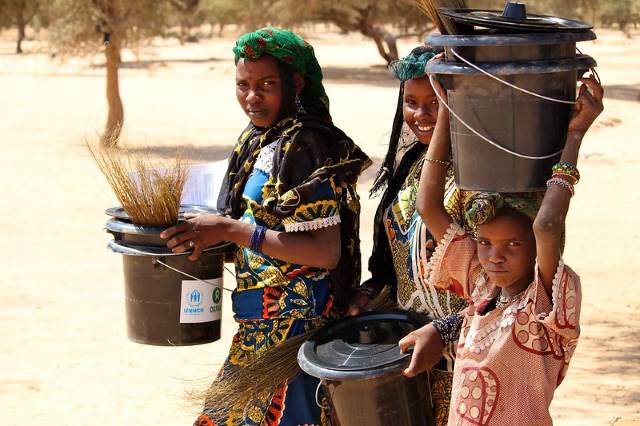The Impact of Conflict on Poverty in Mali

Conflict can be a catalyst for an array of poverty-related events. It can impact poverty by depleting resources, interrupting supply chains, destroying infrastructure, taking lives and much more. Unfortunately, this trend has held in the country of Mali, which currently shows the significant impact of conflict on poverty.
Conflict Background and Economic Impact
The Mali War is an ongoing conflict that began in January 2012. Since then, violence between the north and south of Mali has ebbed and flowed in severity but never subsided. Malian people, including the Tuareg, in the north of Mali, have expressed resentment and concern as they feel that governmental groups and political factions are neglecting their concerns and treating them unfairly. Ethnic divides, fundamentalist fighters and an unstable political system contribute to this conflict.
So far, Mali has noted thousands of deaths and thousands of more people fleeing the conflict. As mentioned previously, many connect the weak economic sector in Mali to the outbreak of unrest and violence. Almost cyclically, this violence is now negatively impacting the economic sector. Before the conflict broke out, tourism accounted for more than 40% of Mali’s GDP. Researchers estimate that 8,000 people lost their jobs due to the drastic decrease in tourism after the conflict began. The economic connection highlights the ranging impact of conflict on poverty.
Many of those living in the north of Mali, mostly Tuareg and Arab groups, depending on the agricultural sector for their income. The government has invested very little in this sector and focuses primarily on tourism and the export of gold and cotton from the south. This has led many agricultural producers in the south to grow jaded toward the government due to their increased likelihood of experiencing extreme poverty.
The Impact on Public Health
Roughly one in three children in Mali are facing chronic malnutrition. An annual average of nearly 4 million people in Mali do not have access to an adequate amount of food. More than half of Mali’s children and young adults are illiterate and displacement has forced many out of school. A significant number of children in Mali are at great risk of recruitment into militant groups, further threatening children’s safety, educational resources and ability to climb out of poverty.
At its base level, the conflict in Mali threatens public health by the sheer loss of life it has caused. In 2018, armed groups killed hundreds of civilians. The byproducts of this violence caused even more people to experience extreme poverty, malnutrition and death. Additionally, more than 200,000 people have fled Mali altogether to avoid the violence. This stunts Mali’s economic growth, which reaffirms the dangerous impact of conflict on poverty.
Current Aid and Support Efforts
A military coup ousted the former president of Mali, Ibrahim Boubacar Keïta, on August 19, 2020. President Bah Ndaw became the interim leader of Mali and will hold the position until Mali can hold an election. Some are hopeful that if the nation can hold a legitimate election, much of the conflict in Mali will subside. In the meantime, many local and international nonprofit organizations are mobilizing to aid in poverty reduction efforts throughout Mali.
- World Vision began providing aid in Mali in 1975, even before the conflict. In 2012, during the height of the conflict, World Vision provided aid in the form of food, clean water and shelter to more than 150,000 people throughout Mali. Additionally, more than 60,000 children in Mali are currently benefiting from World Vision’s child sponsorship program. The program allows donors to provide monetary assistance to and communicate with an impoverished child. Many of these sponsored children in Mali reside within conflict-ridden areas.
- Peace Direct, another nonprofit organization, focuses on peacebuilding efforts in Mali. The organization supports communities in their implementation of peacebuilding; in 2019 alone, Peace Direct supported more than 20 projects throughout Mali. Peace Direct realizes the importance of community growth, both physically and emotionally, to peacebuilding. A lack of communal trust can be detrimental to poverty reduction as teamwork makes progress more effective and efficient. Additionally, the building of trust and understanding among conflict groups is essential to support continued growth and stability throughout Mali. This trust will prevent future conflicts and allow Mali to focus on economic growth and poverty reduction tactics throughout the country.
- The Peacebuilding Stabilization and Reconciliation Project, run through USAID, began in April 2018 and should reach completion in March 2023. This project focuses on rebuilding many of the conflict-ridden areas throughout Mali, providing rehabilitation resources to those impacted by the violence, increasing civic engagement and helping Mali’s government introduce measures to prevent violent outbreaks in the future. USAID believes that providing community members with an active role in their governance will decrease dissent, enhance democratic values, reduce the likelihood of future conflict and decrease the poverty level throughout Mali. Success will also ideally increase GDP and overall well-being while mitigating the impact of conflict on poverty in Mali.
The Future of the Region
The domino effect that violence can have on the prosperity of a nation comes as no surprise. Violence decreases an individual’s ability to focus on economic growth or public health. It overtakes governmental initiatives and grabs attention from the media, forcing poverty-related issues to take a backseat. The importance of the international community supporting peacebuilding efforts in Mali remains essential. The path toward peace will trickle-down benefits for many subsets of Mali’s society and will decrease the occurrence of extreme poverty throughout the nation.
– Danielle Forrey
Photo: Flickr
